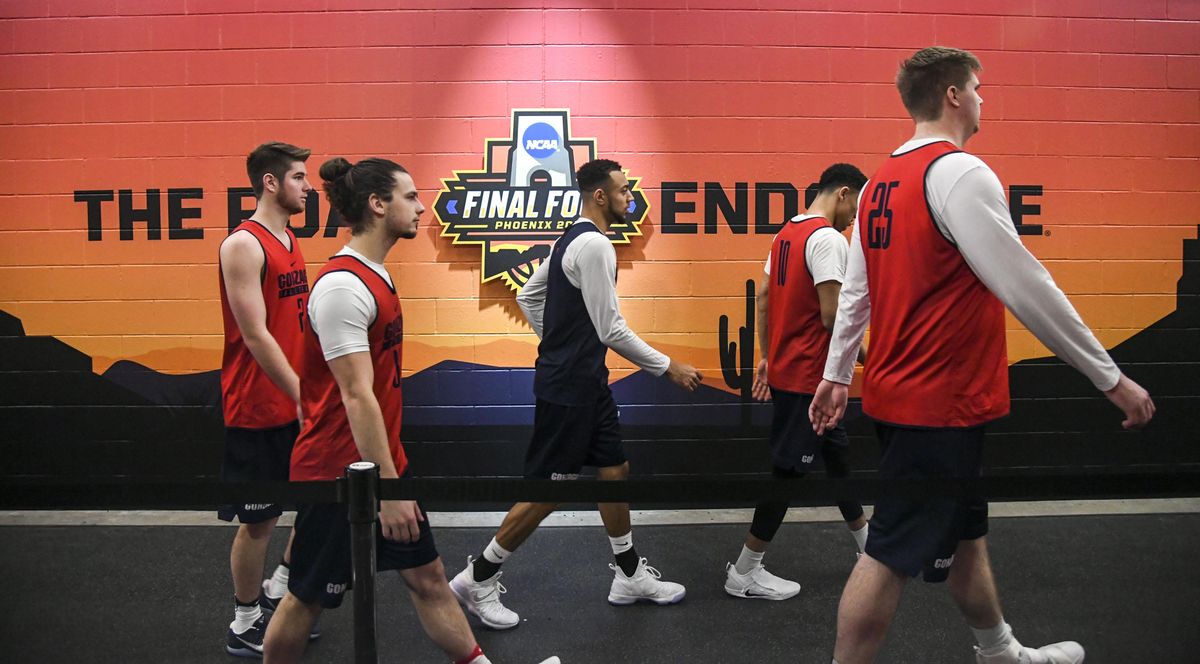John Blanchette: Final Four coaches Mark Few, Frank Martin rooted in humility

GLENDALE, Ariz. – The salad days – do they call it that because you can’t afford the entrée?
That was pretty much the case back when Mark Few shared a house on Spokane’s north side with fellow Gonzaga assistants Dan Monson and Bill Grier in the 1990s. Actually, it was Monson’s place. Few paid what little rent he could afford. Grier, whose stipend as what the NCAA at the time so euphemistically called the “limited earnings coach” was more limited than most, made his contributions more on the domestic level.
But they were young college coaches living life as high as the few dollars and what freedom their boss, Dan Fitzgerald, allowed. And one of their times to cut loose was the Final Four.
“It’s a big deal,” Few said. “Assistant coaches – everybody – they invade this place. It’s crazy.
“So Dan got the bright idea to leave on our old-school answering machine, ‘Hey, we’re out of here! We’re going back to the Final Four and we’ll be back on Tuesday.’ So we come rolling back and our entire place – they stole everything. We left our papers on the front (porch). We left everything. They took everything.”
The good news: everything probably wasn’t a lot in those days.
Not for Few and not for Frank Martin, two coaches who couldn’t seem to be less alike except that their roots were humble and their achievements have been great.
The meeting of their teams – Gonzaga and South Carolina – on Saturday in the Final Four is a study in contrasting miens and subtle similarities, and maybe even a glimmer of hope for the high school JV coach who dreams big.
Because that’s where both Few and Martin started.
A lot of people work their way up from the mailroom, coaches included. It’s the kind of thing that makes Martin laugh, remembering as he does his hiring at Kansas State in 2007 and suggestions that he’d fail because he was “nothing but a high school coach.
“What you didn’t understand is you were paying me the ultimate compliment,” Martin said. “You were calling me an educator.”
It’s almost federal law that a tale like Martin’s must include up-by-the-bootstraps imagery. The son of Cuban political exiles, he grew up in hardscrabble Little Havana in Miami, his single mother abandoned by her husband. His own modest basketball career derailed at 19 when he blew out a knee, he was drafted by his old high school coach at Miami Senior to help out when the JV coach didn’t show up one day. And like a lot of young coaches, he had to moonlight to eat.
For Martin, that meant working as a bouncer at a few Miami night clubs – Calico Jack’s, Stefano’s and “one in South Beach that wasn’t fun,” he said.
In 1992, a group he’d booted for fighting returned at 2:30 a.m. with a gun and fired shots at him. Coaching full-time seemed like a much better gig.
Eventually, as Miami Senior’s head coach, he won three straight state titles. But the last was stripped and Martin fired in a scandal over players being recruited and receiving housing assistance – charges he still denies while saying, “I was responsible.” A year later, Rudy Keeling hired him to be an assistant at Northeastern in Boston at $28,000 – he and a fellow assistant commuted from Providence because he couldn’t afford Boston rents. That started his climb in the coaching ranks, but he often looks back.
“I started coaching in the same neighborhood I grew up in, coaching the younger brothers and sons of people that lived down the block,” he said. “That community is what gave me a way to get out, what helped raise me.”
Likewise, Few’s start in little Creswell, Ore., came coaching the JVs at his old high school, while still an undergrad at Oregon.
“I owe my old high school coach Doug Orton,” he said. “When I played under him, he always made me think of the ‘whys’ – ‘this is why we’re doing this defense This is why we’re running this play’ as opposed to not thinking about it. And that stuck with me. And when I was getting done (at Oregon), I thought why not try this?”
Later, when Orton retired, Few applied for the job, only to get passed over by a superintendent who still tells the joke on himself. Soon, a connection with Monson through working camps at UO landed him one of those “limited earnings” spots at Gonzaga – for $1,500 a year.
Twenty-eight years later, things aren’t so modest. On Thursday, Few recalled even the school’s first NCAA run “innocent … the good old days.” So it’s not a surprise, even at this pinnacle, to hear him retreat to core values.
“I’ve always just wanted the guys to have the best that they could possibly have at Gonzaga,” Few said. “The year they were there, the four years, the five – I want it to be absolutely the best. That’s really all I care about.”
If it sounds like a JV coach’s sentiment, it sort of is.
